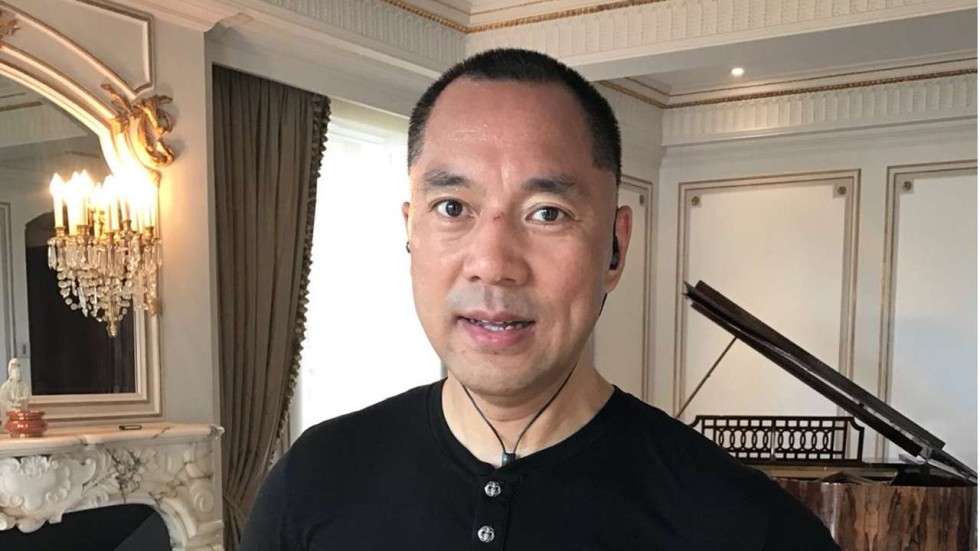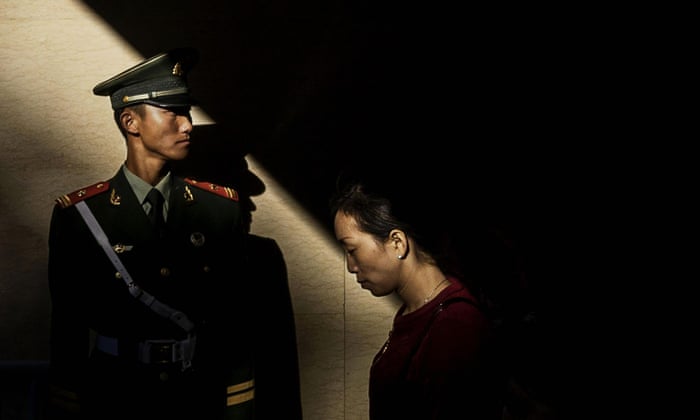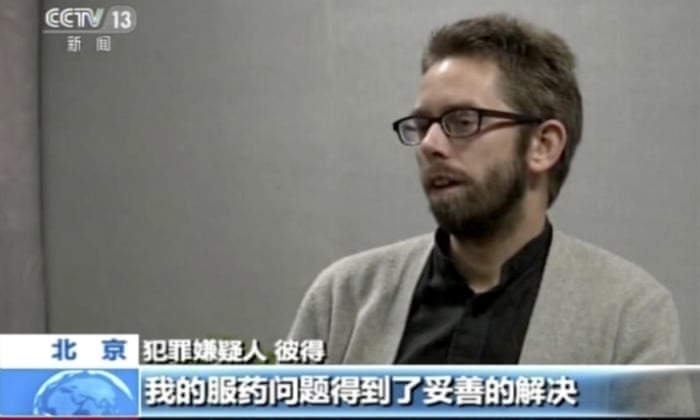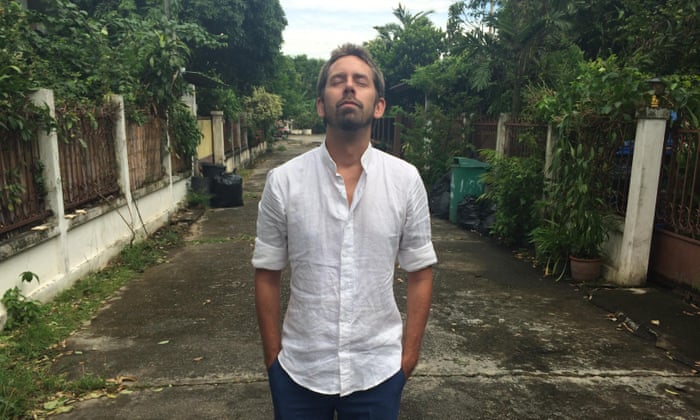says he tucks a “big-ass knife” under his bed in case intruders come for him as he dozes; others he cannot sleep at all.
“They’ve kidnapped people several times here before,” says the 36-year-old Swedish human rights activist, chain-smoking Marlboro cigarettes as he remembers the 23 days he spent in secret detention in
.
.
On 3 January 2016 Chinese security agents encircled the activist’s Beijing home and spirited him and his Chinese girlfriend,
, off to a covert interrogation centre he now calls “The Residence”.
Months have now passed but the memories of that spell in custody have proved hard to shake.
In the four years since
Xi became China’s top leader in November 2012,
feminist campaigners, journalists, academics, bloggers, publishers, human rights lawyers and even foreign non-governmental organisation workers such as Dahlin have all been targeted in a
coordinated Communist party push to prevent the development of organised opposition to the regime.
The political situation, which some call
the most dire since the Tiananmen Square massacre in 1989, has deteriorated so fast under the current leadership that one scholar claims Xi has built
“the perfect dictatorship” – an ever-more repressive system that nevertheless avoids major international censure.
During his stint behind bars the Swedish activist says he was given a firsthand taste of the harshness with which that battle for control is being waged.
He was blindfolded and confined to a cell with expressionless guards who refused to engage in conversation but noted down his every move; was for days deprived of access to his embassy, the right to exercise or even to sunlight; was forced to endure exhausting late-night interrogation sessions conducted by hectoring inquisitors determined to paint him as a spy; subjected to a lie-detection machine intended to extract information about his work; and suffered periods of sleep deprivation intended to weaken his resolve.
Dahlin, who until his detention had run a Beijing-based rights organisation called the Chinese Urgent Action Working Group or China Action, said during the seven years he lived and worked as an activist in China friends and diplomats had always considered him an optimist about the country’s future.
Those illusions have been shattered by the things he witnessed in the lead-up to his incarceration at The Residence.
“For the first time I am not optimistic any more,” he says.
“This is how China will operate for the next 20 years. Now it’s a new hard line.”
The underground activistPeter Dahlin arrived in China from his native
Sweden in the summer of 2004, a 23-year-old political science graduate keen for a taste of the world outside a lecture theatre.
“I was just there to backpack and learn,” recalls Dahlin, whose travels took him through Beijing, Shanghai and Xiamen, the south-eastern port where Xi served as vice-mayor in the 1980s.
Three years later he returned, throwing himself into human rights work alongside
Hou Wenzhou, a Chinese activist he had met online.
Dahlin’s first project was a report denouncing the existence of an illegal nationwide network of secret detention facilities called “
black jails”.
It identified eight such prisons in Beijing.About the same time Dahlin met
Wang Quanzhang, a crusading civil rights lawyer known for his defence of China’s downtrodden and outspoken criticism of the government.
Together, in 2009, they founded
China Action, a non-profit advocacy group dedicated to supporting human rights defenders in the one-party state.
Increasingly draconian laws make it effectively impossible for such non-governmental rights organisations to operate legally in mainland China.
Instead the pair registered their group as a company in Hong Kong and decided they would strive to operate in the shadows so as to avoid attracting attention.
“I decided we had a shot at doing something quite special,” Dahlin says of the group’s creation.
The Swedish activist says he was partly driven by “middle-class guilt” but also a conviction that people should be the masters of their own destinies.
“I’ve never been particularly political,” he says.
“I’ve never paid attention to Tibet and these issues very much.
“I just believe in the idea of self-determination.
“Whether it is Scottish people, the Catalan people, the Tibetan people or even just a village somewhere in China; that the people there should be the ones that have an influence, whether it is by forming an organisation, a labour union, their own media, whatever.”
Guided by those beliefs, Dahlin set about building China Action into a small but potent force for social change.
With grants from institutions that included the European Union, the National Endowment For Democracy and the Norwegian Human Rights Fund it ran training sessions for human rights lawyers and investigative journalists and offered support to young Chinese campaigners traumatised by run-ins with the security services.
Just as China Action was ramping up its operations, however, the human rights situation in China took a turn for the worse.
The crackdown beginsMany accuse Xi of initiating the current chill but some trace it back to around 2008 when
anti-government protests rocked Tibet just as China was preparing to host the Summer Olympics.
Deadly riots the following year in China’s far west left authorities even more convinced that it was time to step up their controls over society.
In Beijing Dahlin sought to fly under the radar, moving into a one-bedroom studio hidden in the alleys around the 13th century Drum Tower and disguising his trueline of work with a series of legends.
He told some he was the son of a wealthy Swedish businessman who was in China researching the electric bicycle industry; to others he introduced himself as a legal researcher or expat English teacher, “just to see the way the conversation dies”.
“Even my close friends didn’t know about my work,” he says.
“They knew I did something to do with an NGO and human rights but that is about it. I always operated with a cover.”
A self-professed history geek, Dahlin adopted the surname Beckenridge – an allusion to John C Breckinridge, the vice-president of the Confederate states – but he maintained his first name.
“Any effective cover story has to have 90% truth and then 10% misleading … you always keep your first name to avoid mistakes.”
For a while the subterfuge paid off.
Dahlin’s visas were renewed by public security authorities, despite the fact that his human rights work was officially illegal, and he sensed that police were happy monitoring the group from afar.
“We’re not a political organisation,” he says by way of explanation for why his group was able to keep operating for so long.
“We don’t deal with democracy issues.”
Xi Jinping turned his country into a ‘controlocracy’.
Another prominent member
fled into exile in the US.
It was the start of a concerted clampdown on civil society designed to extinguish organised opposition to Beijing at a time when China’s fading economic boom threatened to undermine its political legitimacy. Stein Ringen, a political scientist whose new book,
The Perfect Dictatorship, examines the dramatic political tightening, said he believed that after a period of “steely and foresightful analysis”, China’s top leaders had concluded they must tighten their grip over the population now that the era of mega-economic growth was over.
“There is an absolute determination that the regime will persist and continue.
That is number one for everything: the perpetuation of the regime.”
Ringen, an emeritus professor at Oxford University, said that in just a few years
Xi had turned his country into a “controlocracy” where an ingenious mix of hard and soft measures were used to ensure the party’s rule went unchallenged.
“It is so smooth that in some respects it doesn’t even look dictatorial,” he said.
“Most dictatorships are very clumsy, raw, inelegant. But this one isn’t. They have it sussed.”
The arrest
As Xi’s crackdown unfolded up and down the country, agents from China’s ministry of state security, a mysterious spy agency tasked with snuffing out political threats to the party, began to move against Dahlin’s group, trying to recruit his assistant as a mole.
“We were well aware that from at least 2013 state security and not just police were actively monitoring us,” he says.
Dahlin began taking extra precautions, memorising the night flights out of Beijing and filling a brown leather satchel with bundles of cash, hard drives, documents, a change of clothes and his passport.
In the summer of 2015 the situation deteriorated further still.
A sweeping police offensive against Chinese human rights lawyers –
the so-called 709 crackdown – began, sucking in “a very large number” of people directly linked to China Action, including Dahlin’s friend and partner Wang, who was seized near the eastern city of Jinan on 3 August.
With those detentions Dahlin sensed the noose was tightening.
“Maybe there will be no more China,” he remembers thinking.
Then on 3 January 2016 the end came.
At about 2pm Dahlin realised China Action was under intense scrutiny when a Chinese associate reported being summoned to meet security officials who had grilled him about a Swedish man named Peter.
Shortly before 4pm the Swede sat down at his computer and began to type an email to a group of close colleagues with the subject line: “Situation”.
“There now seems to be an active investigation,” he wrote, adding that he planned to flee the country and might not return to China “if things get bad”.
“Clear all papers, USBs, computers, phones, pads etc,” Dahlin instructed his workmates.
“These things need to be done ASAP.”
Dahlin spent the afternoon tying up loose ends: shredding documents, saying goodbye to his girlfriend Pan, and taking care of the couple’s cats, Poopi and Dou Gonggong.
He booked a seat on a 3am Cathay Pacific Flight to Hong Kong and from there planned to take another flight to
Thailand.
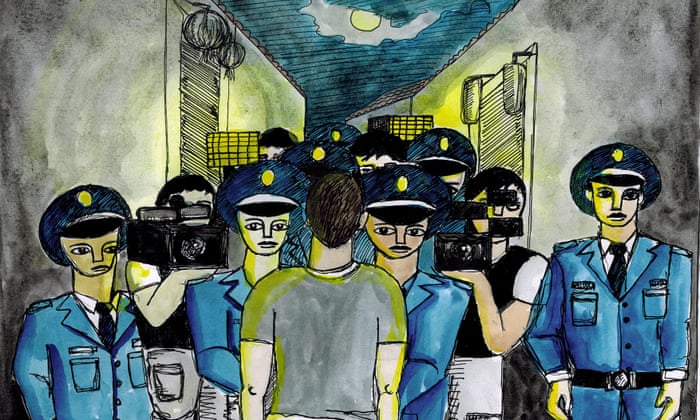 The arrest of Peter Dahlin, as described to the Chiang Mai-based Mexican-American artist Nicolas Luna Fleck
The arrest of Peter Dahlin, as described to the Chiang Mai-based Mexican-American artist Nicolas Luna Fleck
But at 9.45pm – just hours before he had planned to set off for the airport – there was a loud bang on the door.
“Are you Peter Dahlin?” said one of the uniformed agents packing the alleyway outside.
“Well, yeah,” the activist replied.
‘The Residence’
About 15 miles south of Dahlin’s hutong home, not far from Beijing’s Nanyuan military airbase, is a drab, four-storey office block used for the interrogation of those deemed enemies of the Chinese state. “Basically, it is a secret prison,” says Dahlin.
In the early hours of Monday 4 January a convoy of police vehicles pulled up in the ground-floor garage of the U-shaped installation.
Blindfolded, the activist was led out of one of the cars, into a lift and then along a corridor into a second-floor interrogation room.
“You sort of just freeze … It was sort of expected but still you realise that this could end badly – or this could end very badly.”
Dahlin’s first interrogation began about 2am that winter morning, as temperatures outside The Residence plunged to six degrees below zero.
Two male inquisitors sat opposite the prisoner, who was seated in a hard wooden
“tiger chair” with leg shackles that were left splayed out on the floor.
Metals bars crisscrossed the room’s only window.
The initial questioning was less intimidating than the surroundings might have suggested.
“It started fairly innocuously. They were just trying to get a sense of me. Who am I? What am I doing in China? Very basic questioning.”
Dahlin’s ties to three persons of interest seemed of particular concern: the human rights lawyer Wang;
Xing Qingxian, an activist from south-west China; and
Su Changlan, a women’s rights campaigner who had been detained months earlier for offering online support to Hong Kong’s 2014 pro-democracy protests.
But it was a gentle introduction to life in The Residence for the
sleep-deprived activist: three hours later, about 5am, the session was terminated and he was led into a rectangular cell across the corridor with beige padded walls and two small windows that were also covered by metal bars.
Thick blackout curtains made it impossible to tell the time of day; three fluorescent lamps hung from the ceiling, including one directly above the bed.
“Even the toilet seat was suicide-padded,” Dahlin recalls.
Also inside were two guards, part of a team that remained there and watched over Dahlin 24 hours a day and recorded every move or sound he made in a notebook but never uttered a word.
“They would often stand up and go and stand and look when you take a piss, you take a shit, you take a shower. It’s a bit odd,” Dahlin says, adding with a laugh: “Luckily I’m Swedish and Sweden has a rather relaxed idea of nudity.”
The following days were a blur of interrogations.
“They made it clear … that they had followed me, surveilled me intently for a while and were well aware, they said, of what I had been doing.”
Dahlin claims his captors demanded a “map” of who his group had been working with and became “very, very angry” after he refused to talk unless he was allowed to see officials from the Swedish embassy.
His interrogators then refused to let him sleep until he offered them detailed information and only relented after he protested to the centre’s boss – a woman who gave her name as Mrs Zhang – that his treatment violated the UN convention against torture, which China ratified in 1988.
“She was very upset,” Dahlin says of her reaction.
“And went on about how nicely I’m being treated.”
Eventually he was allowed to sleep.
As the questioning sessions continued, often lasting up to six hours at a time, Dahlin, who correctly suspected that Pan and several colleagues were also being detained in the facility, decided his best option was to avoid incriminating others by painting the officers “a big picture … with nothing in it”.
But the interrogators hit back, telling the activist his friends and colleagues were turning against him. “This is your only chance,” they said.
“They are blaming everything on you. If you don’t strike back it is over for you.”
Dahlin held firm, telling his captors China should be proud of its human rights lawyers and flatly rejecting repeated demands for him to surrender information about them or passwords for email accounts and encrypted hard drives that had been seized from his home.
As night fell on the covert prison, unnerving sounds found their way into the activist’s cell from other parts of The Residence, which Dahlin estimated had been built to house about eight prisoners.
“I could hear raised voices. I could hear muffled sounds of what I assumed would be someone slammed against the wall and floor.
“I was quite prepared that there was going to be six months of this. That was my timeframe. I was counting the days in my head.”
As Dahlin floundered in the secret jail the world outside went on.
Having initially denied knowledge of the activist’s disappearance, the Chinese government now admitted
“coercive measures” had been taken against him.
Three days later, on 15 January, a state-run newspaper published
an editorial accusing the activist of funding “radical political activists” who were seeking confrontation with the Communist party.
Friends and relatives called for his release, warning that without access to his medicine, Dahlin, who has Addison’s disease –
a rare hormonal disorder also suffered by John F Kennedy – could die.
Cut off from the world in this hidden jail, Dahlin knew nothing of what was going on outside.
He used music to help him cope with the boredom and stress, attempting to alleviate the tedium by remembering the lyrics of songs by REM, Bob Dylan and Tom Petty and the Heartbreakers.
“You think through everything. Not once or twice but 100 times for each thing. Every friend you had. Every relationship you had. Every date you had … If you sit there for weeks on end with nothing to do you start having weird thoughts because there is nothing left to think about.”
About 10 days into his captivity Dahlin’s ordeal took an Orwellian turn when interrogators told the activist they wanted to use a “communication enhancement” machine – a species of lie detector – to assist with their inquiries.
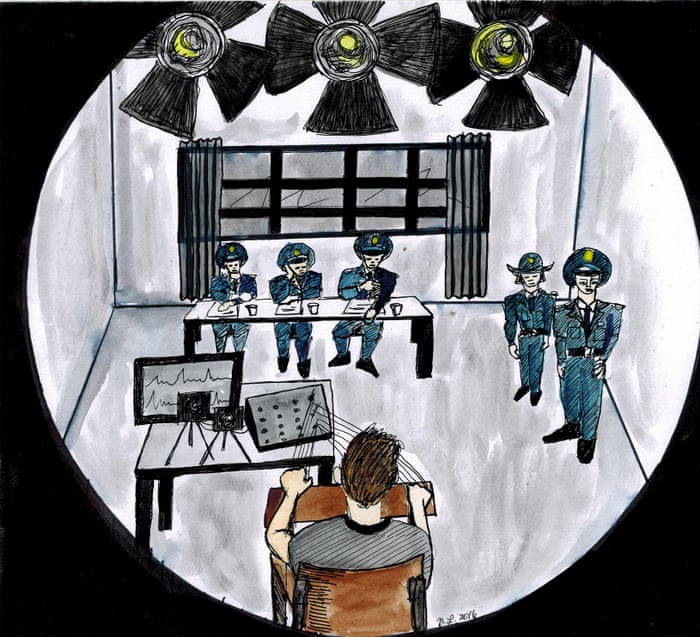 Peter Dahlin faces his interrogators.
Peter Dahlin faces his interrogators.
Electrodes were attached to the activist’s fingertips and small cameras trained on his pupils while he was asked questions.
Dahlin suspects it was “a clever psychological play” to make him reveal details of his group’s work and sponsors – but the device appeared to fail.
“They seemed to have some problem with the fact that my fingertips would sweat so they couldn’t get good readings,” he says.
“I don’t think they got much from it.”
On about day 13 of Dahlin’s stay at The Residence the omens improved.
He was granted a visit from two Swedish consular officials who inquired if he had been given any fruit – “Only one small bite of an apple,” the prisoner replied – then left.
Two nights later came a second positive signal.
At about 3am a group of officers came into his cell and one, whom he knew as Mr Zhang, perched on the edge of his rock-hard mattress.
“I realised something was happening,” Dahlin says.
The confession
Zhang told the activist he would need to pen “a self-criticism” in which he confessed to a series of crimes.
Crucially, Dahlin should admit that the human rights lawyers with whom he had worked were “criminals” and taking money from the National Endowment for Democracy, a US-funded non-profit which has been demonised in countries such as China and Russia as an instigator of colour revolutions.
“Even though they were not among our biggest funders, that was a very core point,” says Dahlin, who believes the attempt to link China Action to the endowment group was intended to help paint his group as a “hostile foreign force” that had been plotting to undermine the Communist party.
The following night Dahlin received a second visit.
“We need one more thing,” the officer told him.
“Let’s make a video.”
Dahlin knew immediately what was being suggested.
Since Xi had taken office
forced televised confessions had come back into vogue, used to humiliate a range of government foes including
Gao Yu, a veteran journalist who was jailed for leaking a politically sensitive document, and
Charles Xue, an internet celebrity known for his online outspokenness on social and political issues.
Within hours Dahlin had been ordered to remove his prison uniform, don his normal clothes and was seated in a room opposite a glamorous female correspondent from the China Central Television, the state broadcaster.
He was handed a set of seven or eight pre-written answers that had been typed on to a sheet of A4 paper.
“Prime time!” the activist says he thought as the camera began to roll.
“Great!”
Dahlin, who had lost nearly 6kg since his detention began, immediately agreed to the recording, knowing it would accelerate his release and, more importantly, that of his girlfriend. “I have been given good food, plenty of sleep and I have suffered no mistreatments of any kind,”
he told his interviewer.
“I have no complaints to make. I think my treatment has been fair.”
Dahlin says he tried to deflect blame from his Chinese associates by shouldering responsibility for his group’s activities.
He refused to label the Chinese lawyers he had worked with as “criminals” but admitted: “I have violated Chinese law through my activities here. I have caused harm to the Chinese government. I have hurt the feelings of the Chinese people.
“I apologise sincerely for this and I am very sorry that this ever happened,” he concluded before the camera was turned off.
The next day those comments were splashed across
China’s party-controlled media with Xinhua, the country’s official news agency, using the “interview” to prove police had
“smashed an illegal organisation that sponsored activities jeopardising China’s national security”.
Dahlin, Xinhua claimed, had been planted in the country by “western anti-China forces” bent on stirring opposition to the regime. As a reward for his video confession Dahlin says he was given a cup of Nescafé instant coffee and a couple of cigarettes.
Less than a week later he and Pan would be free.
Dahlin says the final stages of his three-week stint in a secret jail were among the hardest, even though he sensed his release was imminent.
“I would go from a sense of serene contentment to being exhilarated to being incredibly despondent and thinking, ‘Fuck, this is it. I’m dead.’”
Goodbye to China
On the morning of 21 January he was told he had been granted medical parole and would soon be deported.
Four days later, after being allowed a fleeting meeting with Pan, he was blindfolded and escorted back downstairs into The Residence’s garage.
Flanked by four burly guards in martial arts clothing, Dahlin was driven north towards Beijing’s international airport where he was told he was being expelled under the espionage act.
“Stay out of trouble now,” he recalls being told by one of the security agents, who escorted him on to Scandinavian Airlines Flight 996 to Copenhagen.
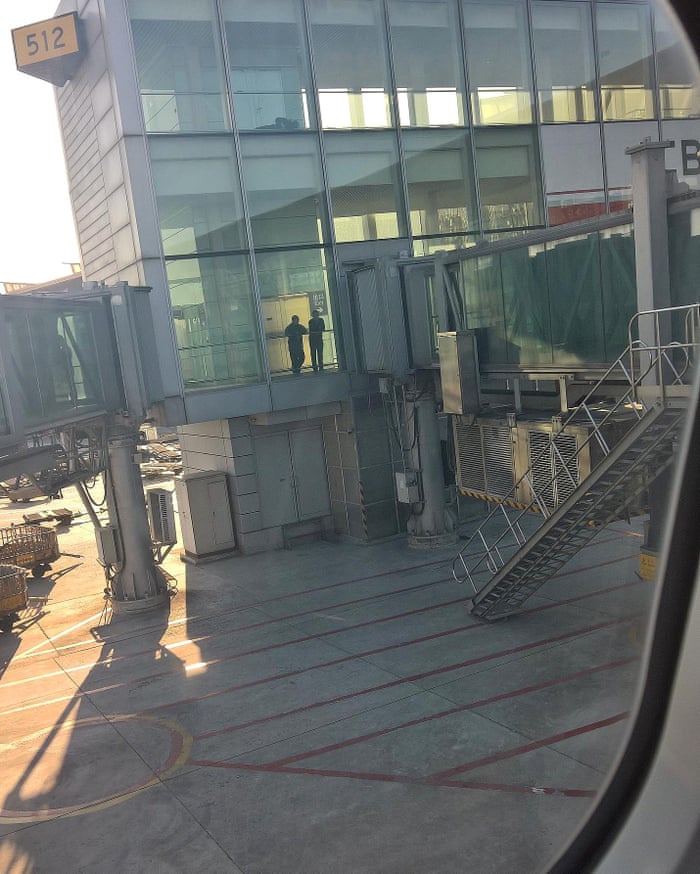 Peter Dahlin’s last view of China and his security minders
Peter Dahlin’s last view of China and his security minders
Onboard the passenger jet Dahlin turned on his phone and snapped one final photograph of China: a surreptitious shot of the security officers who had placed him on his last flight out of the country.
The flight attendant in first class – police officials had used cash confiscated from Dahlin’s home to buy his ticket – handed him a glass of champagne.
“I killed it,” Dahlin says.
“And then I had another glass. I had wine. I had a whisky. I had a beer and I had a coffee. All of the things I hadn’t had.”
Since touching down in Thailand in May, Dahlin says he has been gradually trying to rebuild his life.
After the trauma of 23 days in secret custody and seven years living with the daily stress of concealing his work, he says he is struggling to adapt to a more mundane routine and fears he may be suffering from post-traumatic stress disorder.
“I’ve gotten so used … to living a lie. It takes time to break that habit down.
“I get weird-ass dreams that I never had before; anxiety; never being able to relax properly. I can deal with it – but it takes time,” he says.
“Your mind plays tricks on you. You hear things by the gate at night.”
One afternoon Dahlin remembers suffering a panic attack when he lost sight of Pan, who moved with him to Chiang Mai, in a supermarket and concluded she had been snatched by Chinese agents – as appears to have happened to
a wave of Thailand-based dissidents and Communist party foes.
On another occasion Dahlin’s heart leapt when a group of Chinese men surrounded the couple at a local hotel.
“I thought, ‘Fuck, is this it? Are they here to do something?’”
The here and now
Back in China, the situation is even gloomier.
Recent weeks have seen a fresh round of detentions that suggest the crackdown on human rights lawyers has yet to run its course.Dahlin’s former partner Wang remains in police custody awaiting trial.
“It is not a happy story,” Dahlin says of his friend.
“I think he would rather die than admit defeat in this case [by confessing to crimes he didn’t commit]. He is ready to be a martyr.”
Stein Ringen said he believed the world had failed to grasp the scale of the repression now playing out in China, still viewing the country as a “benevolent autocracy” when in fact it had mutated into “a very, very hard dictatorship which manages to look better than it is”.
Peter Dahlin near his home in Thailand.
The academic said he envisioned no change of direction while Xi, who will reach the halfway point of his anticipated decade-long term in late 2017, was in power.
“Regrettably, I think the best we can hope for is that it doesn’t get worse … My money during Xi Jinping’s tenure would be that what we have now is pretty much what we are going to get – that is a hard dictatorship that is nevertheless tempered by some pragmatism... I’m completely bleak.”
“The alternatives I think are chaos – that the control breaks and that China falls again back into chaos which it has done again and again over the last couple of centuries – or that Xi Jinping’s tightening of controls continues and pulls the system into one of fully fledged totalitarianism.”
On the veranda of his new home, surrounded by wind chimes, hanging planters, and the soothing sound of bird song, Dahlin reminisces about happier times.
He speaks of his admiration for the Chinese campaigners still willing to sacrifice their freedom to promote change and fondly recalls nights spent at his favourite Mongolian whisky bar in Beijing.
“You miss a few things because my exit consisted of going from solitary confinement into an airplane,” he says.
“I left Beijing with a small bag, three books, two changes of clothes, some hard drives and a laptop.
“You do seven years of something … and now it is all gone: your work, whatever you have accomplished, your clothing, your furniture, my cats, my friends.”
But with no political thaw in sight the activist said he doubted he would ever be able to return to the country he once dreamed of transforming.
“I see no reason why they would ever give me a visa to go back. Why would they?”
“I think the only reason I go back is after the government falls. And I’m not sure that is going to happen in my lifetime.”

